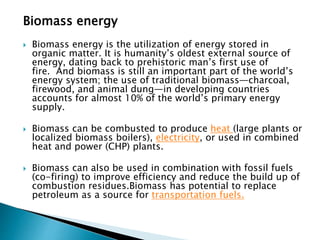
Unlocking Sustainable Energy: Biomass Energy Utilization
Biomass energy utilization stands at the forefront of sustainable solutions, providing a renewable and eco-friendly alternative in the quest for cleaner energy. In this exploration, we delve into the diverse applications, conversion technologies, and environmental benefits that define the innovative landscape of biomass energy utilization.
Diverse Biomass Feedstocks: Nature’s Energy Reservoir
Biomass energy harnesses the power of organic materials sourced from various feedstocks. These include wood, crop residues, organic waste, and energy-dedicated crops. The diversity of biomass feedstocks allows for versatile applications, ranging from traditional heating methods to cutting-edge biofuel production and power generation.
Conversion Technologies: From Biomass to Energy
The transformation of biomass into usable energy involves innovative conversion technologies. Methods such as combustion, gasification, and anaerobic digestion play pivotal roles. Combustion, the traditional method, burns biomass to produce heat, while gasification converts biomass into gas for various applications. Anaerobic digestion utilizes microorganisms to break down organic matter, producing biogas and valuable byproducts.
Power Generation: Fuelling the Grid with Biomass
Biomass contributes significantly to power generation, providing a renewable source of electricity. Biomass power plants employ combustion processes to produce steam that drives turbines connected to generators. The electricity generated from biomass helps diversify the energy mix, reducing reliance on fossil fuels and contributing to a more sustainable and resilient power grid.
Biofuels: Greening the Transportation Sector
Biomass energy extends its influence to the transportation sector through the production of biofuels. Bioethanol and biodiesel, derived from biomass feedstocks, serve as eco-friendly alternatives to traditional fossil fuels. These biofuels, seamlessly integrated into existing infrastructure, offer a cleaner option for vehicles, reducing carbon emissions and mitigating environmental impact.
Heating and Cogeneration: Warming Homes, Generating Power
Biomass plays a crucial role in heating applications, offering sustainable alternatives for residential, commercial, and industrial spaces. Biomass boilers and stoves utilize organic materials to produce heat, while cogeneration systems, or combined heat and power (CHP), simultaneously generate electricity and useful heat, maximizing overall energy efficiency.
Environmental Benefits: A Carbon-Neutral Cycle
One of the most notable advantages of biomass energy utilization lies in its environmental benefits. The carbon emitted during combustion is offset by the carbon absorbed during the growth of biomass feedstocks. This cyclical process results in a carbon-neutral energy cycle, making biomass a sustainable option that helps combat climate change and reduce greenhouse gas emissions.
Waste-to-Energy Solutions: Transforming Organic Waste
Biomass energy is instrumental in waste-to-energy solutions, converting organic waste into valuable energy. This aligns with the principles of a circular economy, where resources are efficiently utilized, and waste is transformed into valuable commodities. Biomass energy thus becomes a key player in sustainable waste management practices.
Challenges and Innovations: Advancing Biomass Efficiency
While biomass energy offers numerous benefits, challenges exist, including concerns about land use, resource competition, and technological limitations. Ongoing research focuses on addressing these challenges through innovative solutions such as improved feedstock selection, advanced conversion technologies, and sustainable land-use practices to enhance overall efficiency and sustainability.
Global Adoption and Policy Support: Shaping the Energy Landscape
The global adoption of biomass energy is evident in the increasing number of countries incorporating it into their energy portfolios. Government policies and incentives play a crucial role in promoting biomass utilization. Supportive policies encourage investment, research, and development, fostering a conducive environment for the growth of biomass energy technologies.
Linking to the Future: Biomass Energy Utilization
To explore in-depth insights into the innovations, applications, and environmental benefits of biomass energy utilization, visit Biomass Energy Utilization. This link provides valuable resources, updates on global initiatives, and insights into the transformative journey of biomass energy. Discover how biomass is revolutionizing the energy landscape and contributing to a sustainable future.



